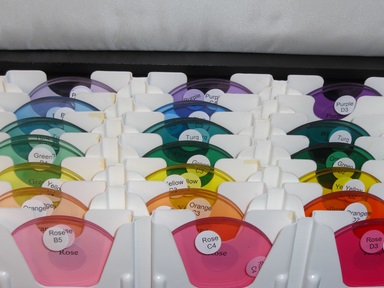-
Appointments
Mon - Sat: 9.30 - 6.00
Coloured Overlays, Eye Strain and Dyslexia
Coloured Overlays
Scientific research has shown that the use of coloured filters on spectacles or coloured overlays laid over text can help some children and adults to read better.
The coloured overlays help to reduce  the perceptual distortions of text which can sometimes be reported. This enables more fluent reading with less discomfort and fewer headaches.
the perceptual distortions of text which can sometimes be reported. This enables more fluent reading with less discomfort and fewer headaches.
Some symptoms which can often be described are:
- Eye strain or headaches when reading
- Words moving or being blurry
- Poor concentration
- Problems associated with glare from the page
A coloured overlay assessment is carried out only after a full eye examination and if symptoms are still present after the appropriate spectacles or exercises have been prescribed.
This consists of allowing the individual to view text through different coloured acetates. Their response is then recorded to the different colours, and through a process of elimination, the best colour or combination is determined.
For further information, please contact us.
Dyslexia
Dyslexia, also known as alexia or developmental reading disorder, is characterized by difficulties learning to read and differing comprehension of language despite normal or above-average intelligence. This includes difficulty with phonological awareness, phonological decoding, processing speed, orthographic coding, auditory short-term memory, language skills and verbal comprehension.
Dyslexia is the most common learning difficulty. Some see dyslexia as distinct from reading difficulties resulting from other causes, such as a non-neurological deficiency with hearing or vision, or poor reading instruction. There are three proposed cognitive subtypes of dyslexia (auditory, visual and attentional), although individual cases of dyslexia are better explained by specific underlying neuropsychological deficits (e.g. attention deficit hyperactivity disorder, a visual processing disorder / visual stress) and co-occurring learning difficulties (e.g. dyscalculia and dysgraphia). Although it is considered to be a receptive (afferent) language-based learning disability, dyslexia also affects one's expressive (efferent) language skills.
Back Next